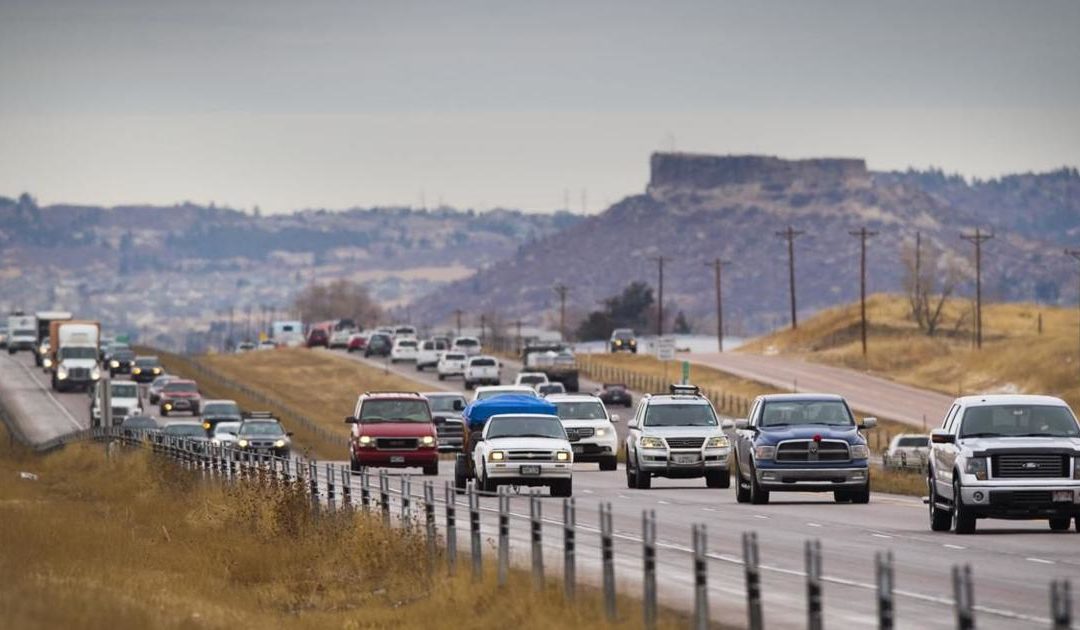The state of Colorado wants all large businesses in the metro Denver area to track what their employees do before and after work when it comes to commuting.
It wants those employers to “increase parking charges” for gas-powered vehicles, appoint an “Employee Transportation Coordinator” to administer programs that reduce “single occupied vehicle” commutes and offer fully or partially subsidized public transportation passes — even if the business is nowhere near any.
And it wants those plans from 2,764 businesses with some 900,000 employees — which could cost anywhere from $7,200-$811,643 annually to implement — by Jan. 1, 2022, according to state records.
The effort dubbed the Employee Trip Reduction Program, part of legislation passed in 2019 to help reduce greenhouse gas emissions in Colorado, comes as businesses are recovering from a pandemic year that saw entire industries shut down and unemployment skyrocket.
Some businesses are understandably concerned about the new regulations, said representatives from the Denver Metro Chamber of Commerce, Denver South Economic Development Partnership and Colorado Business Roundtable.
“We recognize air quality is an important issue and the business community acknowledges the need for action — many are already taking these steps,” said Thomas Brook, president and CEO of Denver South. But it’s asking the state “what can you do to put in a program that’s voluntary or regulated in a way that it actually has meaningful impact on the air quality and do so in a way that’s minimally intrusive to the business community, whose function after all is to run a business.”
The Chamber and Denver South on Friday submitted comments to Colorado’s Air Quality Control Commission — the nine-member citizen panel populated with Gov. Jared Polis appointees, no more than five of whom can be from the same political party.
The commission will meet in mid August to hammer out the rules and regulations, after getting a full report from the Colorado Department of Public Health and Environment’s Air Pollution Control Division, including an economic impact report and input from 25 stakeholders (like the Chamber).
The ETRP lives in Regulation No. 22 under the Colorado Greenhouse Gas Reporting and Emission Reduction Requirements.
Those requirements came from the Colorado legislature by way of HB19-1261 Climate Action Plan to Reduce Pollution, which Polis signed into law in May 2019. It included lofty goals, without many implementation specifics critics assert, of reducing “2025 greenhouse gas emissions by at least 26%, 2030 greenhouse gas emissions by at least 50%, and 2050 greenhouse gas emissions by at least 90% of the levels of statewide greenhouse gas emissions that existed in 2005.”
To help get there, the trip reduction program was introduced.
It’s 10 pages of regulations that would impact large businesses, defined as 100 or more employees, in the area labeled an “8-Hour Ozone Control Area” that includes the counties: Adams, Arapahoe, Boulder, Douglas and Jefferson. It also includes the city and county of Denver, of course, with Broomfield and parts of Weld and Larimer counties.
The regulations describe an employee as not only one on payroll, or salary, but also “every person in the service of an employer, under any contract of hire.” Each of those employees or contractors would have to be surveyed on how they get to work, what kind of vehicle they drive, and travel distance from home.
Then, in an effort to reduce “single occupied vehicle” trips during peak commuting hours, the employer must offer things like employee shuttles, flexible schedule perks to those who drive electric vehicles, carpooling and ride-share options, subsidized public transportation passes, bike parking and showers, among others.
Cost estimates vary wildly depending on the size of the company, and the trip reduction efforts implemented, from $7,200-$800,000. But state officials dispute cost “exaggerations” and say the programs could save employers and employees money in the long run.
“A lot of these things will be a net savings in the end,” said Clay Clarke, Climate Unit supervisor from the Air Pollution Control Division, saying the $800,000 estimate in the report “assumed unrealistically that an employer would use more expensive options such as providing transit passes at a daily rate as opposed to monthly.
“What we will hear from transportation management officials who have seen these programs in place is that information about the real costs are much lower than those high-end estimates.”
He also disputed the “misinformation” that the transportation coordinator would require a full-time position, or a new hire.
“This is not a full-time-employee worth of work,” he said. “Many companies already have an employee that’s likely doing it.”
The Division documented its outreach efforts: 3,686 letters mailed; five large listening sessions with almost 800 participants, seven listening sessions specifically for ETRP with almost 500 registrants, 25 stakeholder meetings and 90 written comments.
“The idea is to provide (employees) incentives and options that are flexible to the industry or businesses,” Clark said.
The cost of the trip-reduction program is only one of the concerns business groups have with the proposed regulations.
“This is a real legal question,” said Laura Giocomo Rizzo, senior vice president of external affairs for the Denver Metro Chamber of Commerce. “How can an employer be responsible for an employee’s off-duty behavior? You could buy every employee a bike, charge $1,000 for parking, but ultimately we live in a country where people get to work how they want or can. This punishes employers and puts them in a weird position.”
While the proposed regulations exclude employees who use the car “as part of their job responsibility for emergency response,” it doesn’t exclude single mothers who have day-care responsibilities, or employees who care for sick or elderly relatives, Giocomo Rizzo said.
“This is another example of the legislature passing vague laws, but the details are where the rubber really hits the road,” she said, pointing to the other example of the recently implemented Equal Pay law that’s causing some companies to exclude Colorado residents as applicants.
The Colorado Business Roundtable, a public policy organization with “executives from some of the state’s largest employers,” sent a notice to all members opposing the program.
“We share a common goal of achieving clean air and a healthy environment but incentives and education are far better tools than regulations and penalties,” according to the emailed statement. “With the Commission estimating that the cost to implement the program could reach as much as $800,000 annually for larger employers, the economic impact would be devastating and would likely result in job losses and higher prices for consumers. After the global pandemic and witnessing the economic upheaval of a lifetime, Coloradans should remain laser focused on economic recovery, not new regulations.”
Brook said Denver South, which represents some 250,000 employees and is “one of the largest employment regions in the state,” is hoping the regulations are made voluntary, or come with no penalties.
The organization raised the same concerns about whether employers “have the right or legal authority to regulate an employee’s behavior” when they’re off the clock.
“We also don’t believe it takes into account businesses’ access to, or level of, public transportation,” Brook said. “There are widely disparate levels of transit access.”
The regulations could also disproportionately affect “blue-collar” employers like those in the service or manufacturing industries.
“Many of those white-collar jobs, like customer service phone support, can potentially be done from home,” Brook said, meaning those employers can get credit for those single-occupancy vehicle trip cuts, but employers like a grocery store or restaurant whose employees must physically be at work will be penalized.
There’s also the issue of companies below 100 employees who would hesitate to expand here if it would bring all the ETRP regulations down on them, he said.
“We know the health department is in a tough spot here, and the Air Quality (Control) Commission is facing a serious problem,” with dangerous ozone levels, Brook said. “We want to collaborate to come to a solution that will address the problem while allowing employers to continue to recover from the Covid-19 crisis.”
This content was originally published here.





